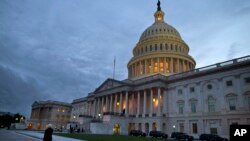CAPITOL HILL —
A select group of U.S. lawmakers from both political parties and both houses of Congress began work Wednesday to end a budget stalemate that helped provoke a partial government shutdown earlier this month. The budget conference has until mid-December to reach a fiscal accord - weeks before federal spending authority expires once again.
Over the next six weeks, the budget conference will strive to achieve something Congress has been unable to do for years: get Democrats and Republicans to agree on federal spending levels and, if possible, craft a blueprint to improve America’s fiscal health over the next decade.
Although most work will be done behind closed doors, Wednesday’s initial meeting was open to the news media. The 29 conferees took turns speaking, and partisan fiscal divides quickly became apparent.
Republicans, like House Budget Committee Chairman Paul Ryan, are opposed to raising taxes. “Taking more from hard-working families just is not the answer. I know that my Republican colleagues feel the same way. So I want to say this from the get-go [the start]: if this conference becomes an argument about taxes, we are not going to get anywhere. The way to raise revenue is to grow the economy.”
Democrats say a cuts-only approach to solving the nation’s fiscal problems is a non-starter. Senate Budget Committee Chairwoman Patty Murray said she is open to reforming costly programs that provide income and health care to retirees, but only if Republicans show similar flexibility on revenues.
“I am ready to make some tough concessions to get a deal. But compromise runs both ways. While we scour programs to find responsible savings, Republicans are also going to have to work with us to scour the bloated tax code and close some wasteful tax loopholes. Because it is unfair and unacceptable to ask seniors and families to bear this burden alone,” she said.
The conference mirrors the so-called “Super Committee” that tried and failed to reach a long-term budget agreement last year, triggering automatic across-the-board spending cuts that will deepen next year absent a budget deal. Many Democrats want to avoid further cuts to domestic programs, while many Republicans worry about additional military spending reductions. The conference could replace those cuts with other savings, but only if Democrats and Republicans forge a budget deal.
Such a deal also would eliminate the threat of another government shutdown in January, when federal funding runs out once again.
Over the next six weeks, the budget conference will strive to achieve something Congress has been unable to do for years: get Democrats and Republicans to agree on federal spending levels and, if possible, craft a blueprint to improve America’s fiscal health over the next decade.
Although most work will be done behind closed doors, Wednesday’s initial meeting was open to the news media. The 29 conferees took turns speaking, and partisan fiscal divides quickly became apparent.
Republicans, like House Budget Committee Chairman Paul Ryan, are opposed to raising taxes. “Taking more from hard-working families just is not the answer. I know that my Republican colleagues feel the same way. So I want to say this from the get-go [the start]: if this conference becomes an argument about taxes, we are not going to get anywhere. The way to raise revenue is to grow the economy.”
Democrats say a cuts-only approach to solving the nation’s fiscal problems is a non-starter. Senate Budget Committee Chairwoman Patty Murray said she is open to reforming costly programs that provide income and health care to retirees, but only if Republicans show similar flexibility on revenues.
“I am ready to make some tough concessions to get a deal. But compromise runs both ways. While we scour programs to find responsible savings, Republicans are also going to have to work with us to scour the bloated tax code and close some wasteful tax loopholes. Because it is unfair and unacceptable to ask seniors and families to bear this burden alone,” she said.
The conference mirrors the so-called “Super Committee” that tried and failed to reach a long-term budget agreement last year, triggering automatic across-the-board spending cuts that will deepen next year absent a budget deal. Many Democrats want to avoid further cuts to domestic programs, while many Republicans worry about additional military spending reductions. The conference could replace those cuts with other savings, but only if Democrats and Republicans forge a budget deal.
Such a deal also would eliminate the threat of another government shutdown in January, when federal funding runs out once again.











